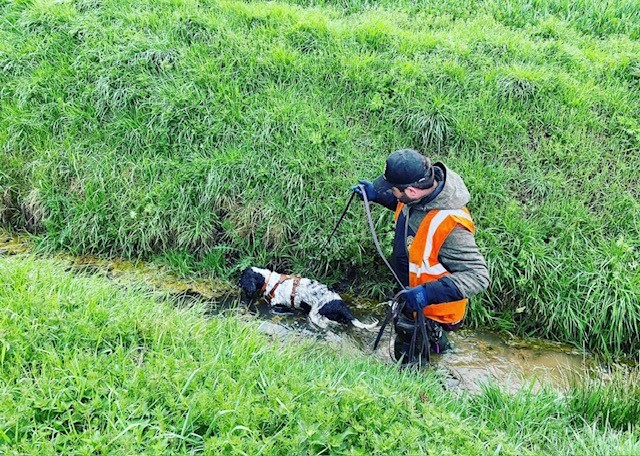Hen Harrier Action Launches Wildlife Crime Detection Dog Fundraising Appeal
Locating the remains of illegally killed birds of prey, often hidden and in remote areas of unforgiving moorland terrain, is painstaking and challenging for the investigation teams from the RSPB, National Wildlife Crime Unit (NWCU) and local force officers. Yet when a satellite tag stops transmitting in suspicious circumstances, this is the task the investigators are faced with, to recover the vital evidence they hope will lead to an arrest and prosecution.
Working collaboratively, the NWCU have introduced several new technologies and tactics over the last 12 months to improve detection and evidence recovery, including the use of tag tracking drones, metal detectors and increasingly, specially trained detection dogs.

An exciting development for wildlife crime detection
According to the head of the NWCU’s Hen Harrier Task Force, DI Mark Harrison, “This is one of the most exciting areas of development for wildlife crime in the UK”.
He adds, “We have tested the dogs on several deployments now and they have been really useful, even locating carcasses buried several inches underground. Combined with metal detectors, we can locate the tags too.
But the NWCU has to fund the dog deployments so we are limited in what we can do.”
The NWCU is a small policing unit of 19 staff that supports front line police officers dealing with wildlife crime across the whole of the UK.
Sniffing out wildlife crime

Louise Wilson is a professional dog trainer and managing director of Conservation K9 Consultancy, who work with the NWCU on the deployment of detection dogs to recover the remains and tags from illegally killed birds of prey. She and her team deploy detection dogs all over the UK in the fight against wildlife crime, and assist in training and mentoring dog teams worldwide to combat illegal poaching and wildlife trafficking, training dogs to detect snares, firearms, ivory and even pangolin scales.
Training can cost over £3,000
“It can take up to 18 months to fully train a deployment-ready detection dog to detect the remains of birds of prey such as Hen Harriers, including feathers and satellite tags,” she says, “and the training can cost over £3,000.”
The costs of deployment, often in remote locations and difficult terrain, can add up to an extra £1,000 to the budget needed by the investigators to use the skills of these highly trained dogs.
“A dog’s sense of smell is at least 100,000 times more sensitive than ours, and they can cover vast areas and rough terrains, working in a non-biased way to find scents concealed within walls, underground and even up trees,” she points out.
A powerful new strategy to combat wildlife crime
And as wildlife criminals go to great lengths to conceal their crimes, hiding carcasses in walls or buried on moorland, detection dogs are proving a powerful new strategy to help raptor persecution investigators retrieve the vital evidence that can lead to a conviction.
Now, there is a way that you can help too.

Raising funds to fight raptor persecution
Hen Harrier Action has launched an appeal on GoFundMe to raise funds to train and deploy more detection dogs in the fight against raptor persecution.
Announced live on air at the charity’s Skydancer Day live broadcast from the Yorkshire Dales National Park, the appeal aims to raise enough money to train at least one additional wildlife crime detection dog, and fund deployments throughout 2025 and beyond.
We have set a target of £10,000 for the campaign, and every penny raised will go directly to the National Wildlife Crime Unit, ringfenced for the training and deployment of detection dogs.
As DI Harrison explains, “We can use the dogs specifically to find Hen Harriers and anything they come into contact with, including the perpetrator. This will have a major impact on our searches and help all Hen Harriers, tagged or not.”

Make a difference today
Hen Harriers and other birds of prey continue to be relentlessly and illegally persecuted – shot, trapped, snared and poisoned – in the UK, despite the legal protection enshrined in the Wildlife & Countryside Act for more than 40 years. Yet the remote locations, the challenges of evidence recovery, and the increasingly sophisticated ploys used by wildlife criminals to avoid detection, mean that few are ever brought to justice.
Now you can help to change this, by donating to this appeal and ensuring that investigation teams are able to deploy highly trained detection dogs and dramatically increase the likelihood of detection, evidence recovery and successful prosecution.

